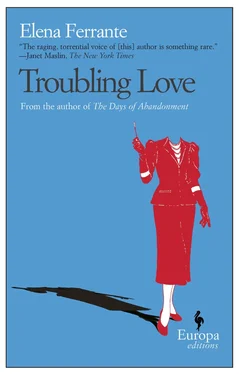“My father has been well only in the last year,” Polledro said in the tone of one who is preparing to exaggerate in order to take advantage of the benevolence of his listener. “Amalia showed toward him a gentleness, an understanding, that I would never have expected.”
It was true — he went on, now changing his tone — that the old man had stolen a lot of money in order to dress fashionably and impress my mother. But Polledro wasn’t complaining about that money. His father had gotten into something worse. And he was afraid that soon he would get himself into bigger trouble. No, it had been a real misfortune: Amalia shouldn’t have done what she did. Drown herself. Why? What a shame, what a shame. Her death was a terrible thing.
At that point Polledro seemed overwhelmed by the memory of my mother and began to apologize for not coming to the funeral, for not having offered his condolences.
“She was an exceptional woman,” he said again and again, even if they had probably never spoken to each other. And then he asked: “Did you know that she and my father were seeing each other?”
I said yes, looking out the window. They were seeing each other. And I saw myself on my mother’s bed, as in astonishment I examined my vagina with a mirror. Seeing each other: Amalia had looked at me, uncertain, and then had slowly closed the bedroom door.
Now the taxi was hugging the gray and busy shoreline: the traffic was heavy and fast-moving, beaten by rain and wind. Tall waves rose from the sea. I had rarely as a girl seen such an impressive storm in the bay. It was like the naïve painted exaggerations of my father. The waves surged darkly, with white crests, easily overflowing the barrier of the rocks, sometimes coming up so far that they sprayed the pavement. The spectacle had attracted groups of the curious who, under forests of umbrellas, pointed with a shout to the highest crests as they hurtled in a million fragments over the seawall.
“Yes, I knew it,” I repeated, with greater conviction.
He was silent for a moment, surprised. Then he began digressing about his own life: a harsh existence, his marriage in shreds, three children he hadn’t seen for a year, difficulty of making a living. Only now was he climbing back up. And he was doing well. I? Was I married? Did I have children? Why not? Did I prefer to live free and independent? Lucky me. Now I would straighten myself up and we would have lunch together. He had to see some friends but, if I didn’t mind, I could go with him. He didn’t have time to spare, however, with a business it was like that. If I could be patient, then we could talk a little.
“Is that all right with you?” he finally remembered to ask.
I smiled, forgetting what I looked like, and followed him out of the taxi, blinded by the water and the wind, forced to move quickly by his hand that was holding me by the arm. He opened a door and pushed me through in front of him, like a hostage, without loosening his grip. I found myself in the lobby of a hotel of neglected splendor, of dusty and moth-eaten opulence. In spite of the precious wood and red velvet, the place seemed miserable: lights too dim for a gray day, an intense murmur of voices in dialect, the clatter of plates and silverware coming from a large room on my left, a strong odor of food, a rushing to and fro of waiters who exchanged rude remarks with each other.
“Is Moffa there?” Polledro asked in dialect of a man at the reception desk. He answered with a nod of irritation that meant: he certainly is, and he’s been here for a while. Polledro left me and hurried to the entrance of the room, where a banquet was in progress. The man at the desk took advantage of this to give me a glance of disgust. I saw myself in a large tall mirror in a gilded frame. The light dress was pasted to my body. I seemed thinner and at the same time more muscular. My hair was stuck to my skull, so that it seemed painted on. My face was as if disfigured by an ugly skin disease, dark with mascara around the eyes and flaking or in patches on my cheekbones and cheeks. In one hand I carried the plastic bag in which I had put all the things I had found in my mother’s suitcase.
Polledro returned, irritated. I understood that he was late because of his father and maybe because of me.
“What do I do now?” he asked the man at the desk.
“Sit, eat, and when the lunch is over talk to him.”
“You can’t find me a place at his table?”
“You’re a fool,” said the man. And he explained ironically, with the air of one who is saying something well known even to the most dull-witted, that at the table of that Moffa were professors, the rector, the mayor, the commissioner for culture, and their wives. A place at that table was unthinkable.
I looked at my childhood friend: he, too, was soaked and in disarray. I saw that he returned my look with embarrassment. He was agitated; the features of the child I remembered appeared and disappeared from his face. I felt pity for him and didn’t want to. I moved toward the dining room to allow him to quarrel with the man at the desk without having to take account of my presence.
I leaned on the glass partition that looked onto the restaurant, careful not to get in the way of the waiters who were going in and out. The piercing voices and the rattle of silverware seemed to me of an insupportable volume. It was a sort of inaugural lunch, or maybe the conclusion, of some congress or convention. There were at least two hundred people. An evident disparity among the diners struck me. Some were restrained, intent, ill at ease, at times ironic, at times accommodating, in general soberly refined. Others were flushed, moving restlessly between food and talk, their bodies laden with everything that might signify the possibility of expense, of streams of money. It was particularly the women who synthesized the differences between their men. Slender bodies wrapped in clothing of a fine make, nourished with great frugality and discreetly illuminated by courteous smiles, sat beside bodies bursting out of tight dresses as costly as they were loud, sparkling with gold and jewels, peevishly silent or chattering and laughing.
From where I was it was difficult to calculate what advantages, what complicities, what ingenuities had brought people so visibly diverse to the same table. On the other hand it didn’t interest me. It struck me only that the room seemed one of the places to which as a child I had imagined my mother escaping as soon as she left the house. If at that moment Amalia had entered, in her blue suit of decades earlier, the delicately colored scarf and the hat with the veil, on the arm of Caserta in his camelhair overcoat, she would certainly have crossed her legs ostentatiously, and looked happily, eyes shining, to right and to left. It was to feasts of food and laughter like this that I imagined her going when she left the house without me and I was sure she would never return. I pictured her brilliant with gold and silver, eating without restraint. I was sure that she, too, as soon as she left the house, stuck out a long red tongue. I wept in the storeroom, beside the bedroom.
“Now he’ll give you the key,” Polledro said speaking from behind me, without the kindness of before, in fact rudely. “Fix yourself up and join me at that table over there.”
I saw him cross the room, skirting a long table, and addressing a deferential greeting to an old man who was speaking in a loud voice to a well-groomed, dignified woman with blue hair, arranged in an old-fashioned style. The greeting was ignored. Polledro looked away, furious, and went to sit down, with his back to me, at a table where a fat man with a black mustache and a heavily made-up woman, in a tight dress that rode too far above her knees when she sat, were devouring their food in silence, ill at ease.
Читать дальше












